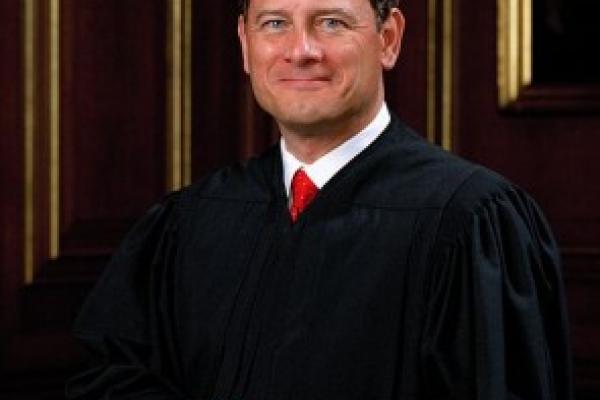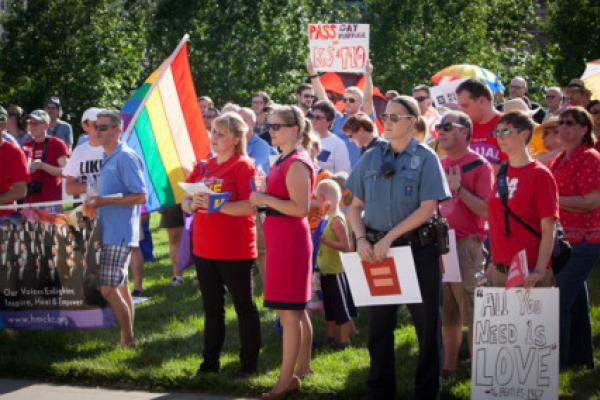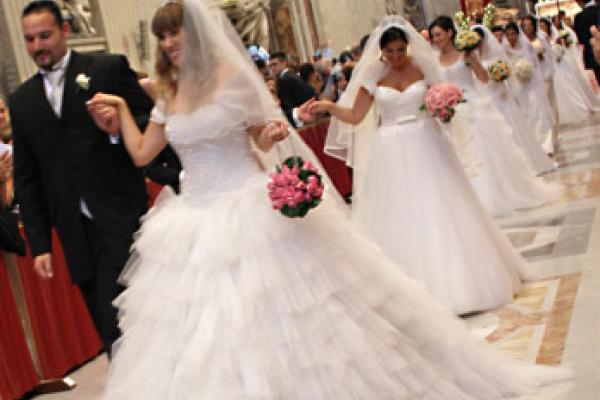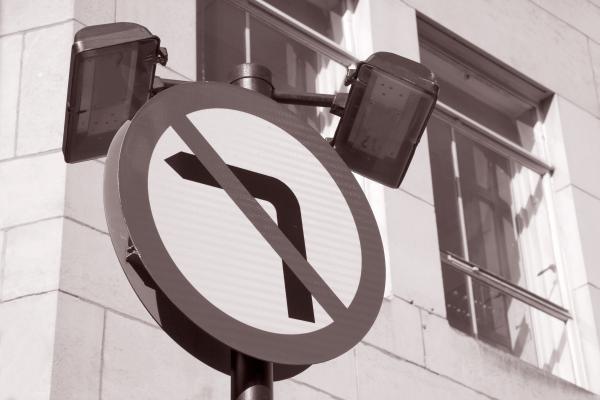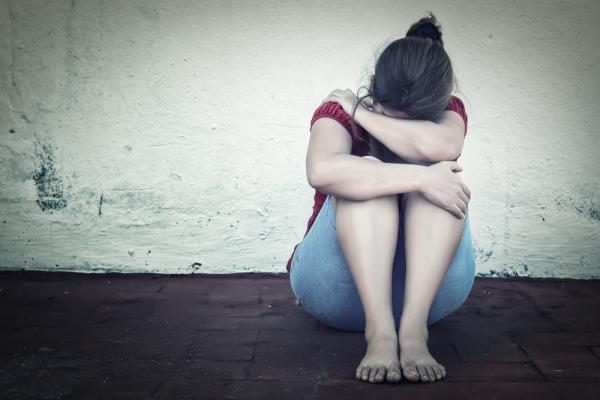In some ways, the case of the Muslim prisoner who wants to grow a beard seems easy. When it comes to a prisoner’s religious rights, federal laws favors accommodation when possible.
So how could Gregory Holt — known as Abdul Maalik Muhammad after his conversion to Islam — possibly lose at the Supreme Court, where the justices heard his case on Oct. 7?
Holt wants to grow a mere half-inch beard — a length of whisker allowed in the vast majority of state prison systems, but not the one where he is incarcerated: Arkansas.
Even Chief Justice John Roberts wondered how such a seemingly straightforward case came before the high court, which usually occupies itself with the thorniest of legal questions.
On Oct. 7, Georgia Walker and I appeared before Judge Matt Whitworth in a Jefferson City, Mo., federal court on a charge of criminal trespass to a military facility. The charge was based on our participation in a June 1 rally at Whiteman Airforce Base protesting drone warfare. Walker and I attempted to deliver a loaf of bread and a letter to the base commander, encouraging the commander to stop cooperating with any further usage of unmanned aerial vehicles, (drones) for surveillance and attacks.
The prosecutor, USAF Captain Daniel Saunders, said that if we would plead guilty to the charge, he would seek a punishment of one month in prison and a $500 fine. We told the prosecutor we could accept a “no contest” plea but were not willing to plead guilty. The prosecutor then said he would recommend a three-month prison sentence and a $500 fine. The judge refused to accept a “no contest” plea. We then requested a trial, which has been set for Dec. 10.
As small bands of protesters from Westboro Baptist Church take their trademark “God Hates Fags” signs to demonstrations outside funerals, concerts, and schools across the country, a new message has come to their Topeka, Kan., headquarters: “God loves gays.”
The God Loves Gays Billboard Project launched Aug. 9 on the crowdfunding site Indiegogo, aiming to raise $50,000 to put up a sign about three miles from the church. Organizers hoped to reach the goal by Oct. 8 but surpassed it about a month and a half early.
On Oct. 6, the campaign reached $100,000, two days after the announcement that there is space for another billboard, this one in Salt Lake City, the heart of Mormon country.
The project shows the power of harnessing online media — in this case, a crowdfunding site such as Indiegogo — to push back against religious hate speech from a reviled source.
The Supreme Court’s decision to sit out the legal battle over same-sex marriage will — for now, at least — leave the future of laws prohibiting gays and lesbians from marrying in the hands of lower state and federal court judges. But it also almost certainly means the couples challenging those laws are more likely to win in the end.
The court said Oct. 6 that it would not hear appeals from five states whose same-sex marriage bans had been invalidated by lower federal courts. The decision, issued without explanation, will likely lead to recognition of gay marriages in 11 more states. It also allows an avalanche of legal challenges to the remaining bans to keep going forward in state and federal courts, where gay and lesbian couples have overwhelmingly prevailed.
The court’s decision leaves unchanged 20 state laws blocking same-sex unions. Each is already under legal attack, facing challenges in state or federal court, and sometimes both. Challenges to marriage bans already have reached a handful of state appeals courts and the federal appeals courts for the 5th, 6th, 9th and 11th circuits.
Some of those judges had been waiting to see what the Supreme Court would do. The court’s instruction Oct 6. was: Proceed.
Pope Francis and his bishops got a wake-up call Oct. 7 from a Wisconsin couple who said the Catholic Church was failing to deal with the collapse of the traditional family.
Jeff and Alice Heinzen of La Crosse told the pope and 180 bishops attending a synod devoted to family issues that they were alarmed by the number of young people born out of wedlock or living with divorced parents.
The couple are one of 14 married couples invited to give their testimony.
“We have seen the number of marriages decline each year and the rate of cohabitation increase,” said the Heinzens, who have been married 34 years. “We know countless divorced adults who have joined other faith communities because they do not feel welcomed in the Catholic Church.”
What’s more, the couple added, the church’s pastoral programs were failing to address the forces impacting marriage and family life.
General Theological Seminary’s campus in the Chelsea neighborhood of Manhattan is everything you’d want in an urban seminary.
Handsome buildings, a chapel at the center, quiet walkways in a noisy city, calm places to read and pray. All serving a wonderfully diverse student body eager to minister in a changing world.
It’s like the best of historic church properties: harking back to a day of noble architecture and tradition and yet looking outward to a frenetic city and changing religious environment.
Why, then, is GTS on the verge of financial collapse and, now, paralyzing internal conflict? Its dean is under attack, 80 percent of its full-time faculty were dismissed, its board is floundering — all in the glare of press and blogosphere.
Why? For the same reason that historic churches and denominations are trapped in “train wrecks.” Their time has passed.
To avoid conflict, it is suggested that friendly conversation omits three things: money, politics, and religion. However, it’s no secret that in current Washington discourse two of these things seem to be indefinitely intertwined. I’ll give you a hint — it’s not “money and religion.”
In the past decade, the intimate relationship between money and politics has infiltrated the public sphere at an alarming rate: corporations set public policy agenda items, super PACS have unlimited reign over campaign finance, and just 0.4 percent of the U.S. population is responsible for funding 63 percent of candidate campaigns, political parties, and PACs.
But what do money and politics have to do with religion? Patrick Carolan, Executive Director of Franciscan Action Network (FAN), explained last week to a group of faith leaders at Catholic University why faith, money, and politics are interconnected.
“All truth passes through three stages. First, it is ridiculed. Second, it is violently opposed. Third, it is accepted as being self-evident.” —Arthur Schopenhauer
I’m visiting Las Vegas this weekend, one of several stops on my postChristian book tour. I’m staying with my aunt and uncle, who are also in ministry, and who I don’t get to spend time with nearly often enough.
My aunt JoLynn was reading aloud a story about the shipping company UPS and how their trucks don’t make left turns. Of course my first reaction was, “well, that’s stupid.” It seems entirely counterintuitive to send trucks on a roundabout circuit when they could much more easily cut the route short by hanging a left. You need to go right, turn right. Need to go left, turn left for crying out loud. It’s just common sense, right?
Maybe not.
UPS has a proprietary navigation system that helps drivers plot out all of their stops in a day and the most efficient way to get there. And based on their research, left turns result in more wasted time and more accidents than they’re worth. Drivers end up stuck at long lights when they could otherwise be turning through a red light making a right turn and making another drop-off. Plus, without left turns, trucks don’t have to cross oncoming traffic, which means fewer collisions.
They save time. They save money. All it took was thinking differently about how the delivery routers should be configured without all of those high risk, time-consuming left turns.
Henri Nouwen was a priest who taught at Harvard, Yale, and Notre Dame. He also was a talented and popular writer. Over time, he became dissatisfied in his role as a professor. He got an unexpected invitation to become chaplain for a community of people with intellectual disabilities in Toronto. He accepted and soon had misgivings.
Henri quickly realized that the people under his care couldn’t care less about what he’d written or how much he‘d learned. They weren’t capable of reading and understanding his beautiful words.
Henri was going to have to change. He would have to start living those words in a deeper way. And that’s hard. (I know full well that it’s much easier to write about things in a flowing way than it is to let those words flow through me in how I live every day.)
He had an experience that drove home the point.
In his book Life of the Beloved, Henri tells of a woman named Janet who lived in the community and was having a difficult time. So she asked Henri for a blessing. He responded in a rote way, putting his thumb to her forehead to make a sign of the cross — something he’d done countless times in his role as a priest.
Janet would have none of it.
“No, that doesn’t work,” she protested. “I want a real blessing!”
I carry a purple purse. I actually bought it three years ago to treat myself to something new. Many women have complimented it, honestly to my surprise. Not that the purse is atrocious, but it does not carry a Gucci, Michael Kors, Coach, Chanel or any other label. It is just a purple purse that fits me and holds my essentials, and sometimes those of my children. Until recently I had not given any second thought to having a purse the color of Barney. Sorry I could not resist.
While reading all of the commentary about professional athletes and abuse, as if they are the only people who offend, I came across a public service announcement for the Purple Purse Campaign. What an a-ha moment. Finally someone gets it. It is one thing to give all of the stats blasting that one out of four women experience domestic violence or that twenty people per minute, men and women, are victims of physical violence at the hands of an intimate partner. It is astoundingly painful to know an estimated three women die each day because a “loved one” could not control himself. The facts are. The truth is.
However, as the Purple Purse Campaign purports, domestic violence is also withholding money or limiting financial freedom. It is verbal assault. Domestic violence is hindering access to family and social circles. Intimacy partner violence involves humiliating the victim. It is harassing people via social media, texting, phone calls or emails. Domestic violence or intimate partner violence can be a physical, mental, financial, emotional, sexual or psychological act. In other words, domestic violence is bullying.
